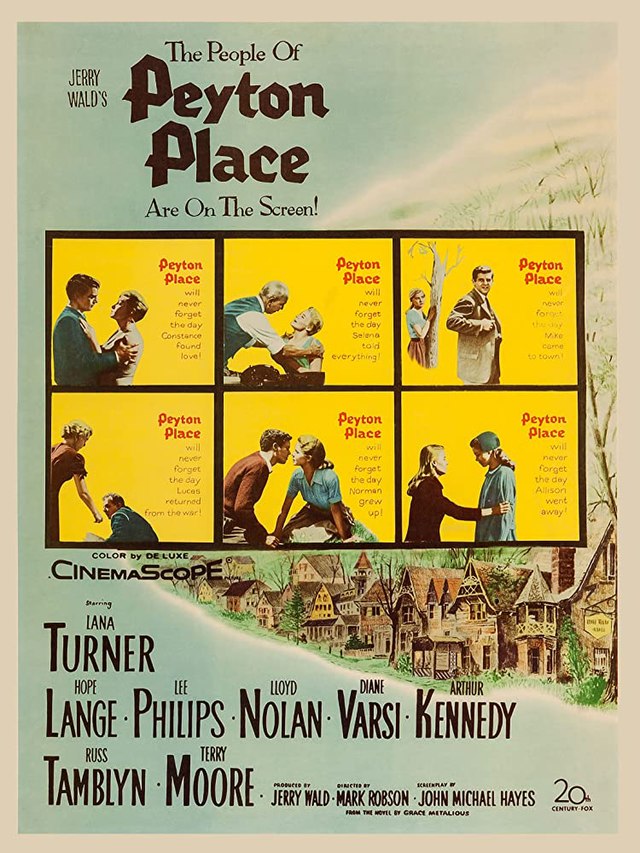Released in 1957 and directed by Mark Robson, “Peyton Place” stands as a seminal work of cinema that delves into the tumultuous lives and hidden secrets of residents in a seemingly idyllic New England town. Adapted from Grace Metalious’s controversial novel of the same name, the film offers a poignant exploration of taboo subjects such as sexual repression, domestic abuse, and societal hypocrisy. With its compelling narrative, rich character development, and thought-provoking themes, “Peyton Place” remains a timeless classic that continues to resonate with audiences decades after its release.
Plot Summary:
Set in the fictional town of Peyton Place, New Hampshire, the film follows the intertwined lives of several residents as they navigate love, betrayal, and scandal in the conservative atmosphere of the 1940s. Central to the story is Allison MacKenzie (played by Diane Varsi), a young girl coming of age in the shadow of her mother’s dark past and her own burgeoning desires.
As Allison grapples with the complexities of adolescence and discovers the truth about her family’s history, she becomes entangled in the lives of other townspeople, including her mother Constance (played by Lana Turner), her friend Selena Cross (played by Hope Lange), and the enigmatic Dr. Michael Rossi (played by Lee Philips). Through their experiences, “Peyton Place” exposes the façade of respectability that masks the town’s darkest secrets and challenges the rigid social norms of the era.
Themes and Analysis:
At its core, “Peyton Place” explores a myriad of themes that resonate with audiences on both a personal and societal level:
- The Facade of Respectability: The film exposes the hypocrisy and moral corruption lurking beneath the surface of small-town America, challenging the idealized image of community and virtue.
- Sexual Repression and Hypocrisy: Through its depiction of forbidden desires and repressed sexuality, “Peyton Place” confronts the taboo subjects of rape, incest, and domestic violence, shedding light on the destructive consequences of societal repression and denial.
- The Search for Identity: The characters in the film grapple with issues of identity and self-discovery, struggling to reconcile their desires and aspirations with the expectations of society and family.
- The Power of Redemption: Despite the darkness and despair that pervade Peyton Place, the film offers glimpses of hope and redemption, as characters confront their past traumas and strive for a better future.
Performances and Direction:
Directed with sensitivity and nuance by Mark Robson, “Peyton Place” boasts a stellar cast of actors who deliver powerful and memorable performances. Lana Turner shines as Constance MacKenzie, capturing the character’s inner turmoil and vulnerability with grace and poise. Diane Varsi delivers a breakout performance as Allison MacKenzie, infusing the character with a blend of innocence and determination that resonates with audiences.
The supporting cast, including Hope Lange, Lee Philips, Arthur Kennedy, and Russ Tamblyn, deliver equally compelling performances, breathing life into the diverse array of characters that populate Peyton Place. Robson’s deft direction and attention to detail ensure that each character’s journey is treated with care and complexity, resulting in a rich tapestry of human emotion and experience.
Legacy and Impact:
“Peyton Place” made a significant impact upon its release, becoming a critical and commercial success and earning nine Academy Award nominations, including Best Picture. The film’s frank portrayal of taboo subjects sparked controversy and debate, paving the way for greater openness and honesty in Hollywood storytelling.
Conclusion:
In conclusion, “Peyton Place” (1957) stands as a landmark achievement in cinematic history, offering a poignant and provocative exploration of the human condition and the complexities of small-town life. Through its compelling narrative, rich character development, and thought-provoking themes, the film continues to captivate and inspire audiences, reminding us of the enduring power of storytelling to illuminate the darkest corners of the human soul and to provoke empathy, understanding, and change. Truly, “Peyton Place” is a timeless classic that transcends its era and continues to resonate with audiences of all generations.
